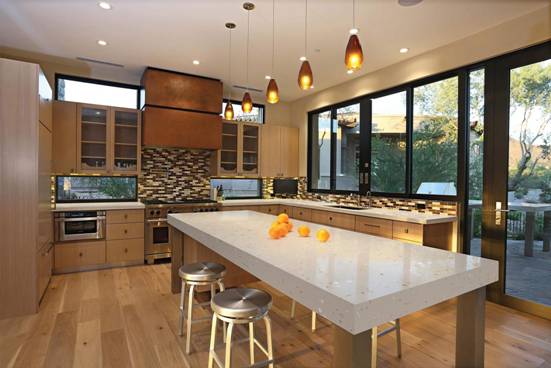
When it comes to choosing the perfect countertop for your kitchen or bathroom, the debate between quartz and marble is a hot topic. Both materials offer unique benefits and aesthetic qualities, making them popular choices for homeowners and designers alike. In this article, we’ll explore the differences between quartz and marble to help you make an informed decision.
Quartz: Quartz countertops are engineered stone, made from about 90-95% crushed natural quartz crystals mixed with resin and pigments. This process allows for a wide range of colors and patterns, making quartz versatile for any design aesthetic. The result is a non-porous, durable surface that mimics the look of natural stone while offering more consistency in appearance.
Marble: Marble, on the other hand, is a natural stone that forms from metamorphosed limestone. Its unique veining and color variations are a result of the mineral composition and geological processes. Each slab of marble is one-of-a-kind, providing an elegant, timeless look that many homeowners desire.
Quartz: One of the standout features of quartz is its durability. It’s resistant to scratches, chips, and stains due to its non-porous nature. This makes cleaning a breeze—most spills can be wiped away with soap and water. However, high heat can damage quartz, so it’s advisable to use trivets for hot pots and pans.
Marble: While marble is beautiful, it’s not as durable as quartz. It’s more prone to scratching and etching, particularly from acidic substances like lemon juice or vinegar. Marble is porous, which means it can absorb stains if not sealed properly. Regular sealing is required to maintain its appearance and prevent damage, making maintenance a bit more labor-intensive.
Quartz: Generally, quartz countertops are comparable in price to high-end marble. However, due to their durability and low maintenance requirements, many homeowners find quartz to be a cost-effective choice in the long run.
Marble: Marble can be quite expensive, especially for rare colors or patterns. Installation costs can also be higher due to the material's weight and the need for specialized labor. While the initial investment may be greater, the timeless beauty of marble can add significant value to your home.
Quartz: Many quartz manufacturers are now producing eco-friendly options, using recycled materials in their slabs. However, the resin used in the manufacturing process can have environmental implications, so it’s essential to choose a reputable brand committed to sustainability.
Marble: Being a natural stone, marble is biodegradable and doesn’t emit harmful substances. However, the quarrying process can be environmentally taxing. If sustainability is a significant concern, sourcing marble from local quarries may reduce its carbon footprint.

Quartz: If you prefer a consistent look with a vast array of color options, quartz is an excellent choice. Its ability to mimic the look of other stones, like granite or even marble, makes it a versatile option for any kitchen or bathroom.
Marble: For those who appreciate natural beauty and uniqueness, marble is unparalleled. Its elegant veining and rich history make it a classic choice that can enhance any space. Marble works particularly well in traditional or luxurious settings.
Quartz: Quartz countertops are a great long-term investment due to their durability and low maintenance. They tend to retain their appearance longer than marble, making them a wise choice for busy households or those who prioritize convenience.
Marble: While marble may require more upkeep, its classic appeal can be a selling point for potential homebuyers. If well-maintained, marble countertops can appreciate over time and contribute to a home's overall aesthetic.
Choosing between quartz and marble ultimately comes down to your lifestyle, aesthetic preferences, and maintenance capabilities. If you’re looking for a durable, low-maintenance option with consistent beauty, quartz is likely the right fit for you. However, if you desire the timeless elegance and unique patterns of natural stone and are willing to invest in maintenance, marble could be your ideal choice.
Assess your needs and preferences carefully to ensure you select a countertop material that not only enhances your space but also fits your lifestyle.